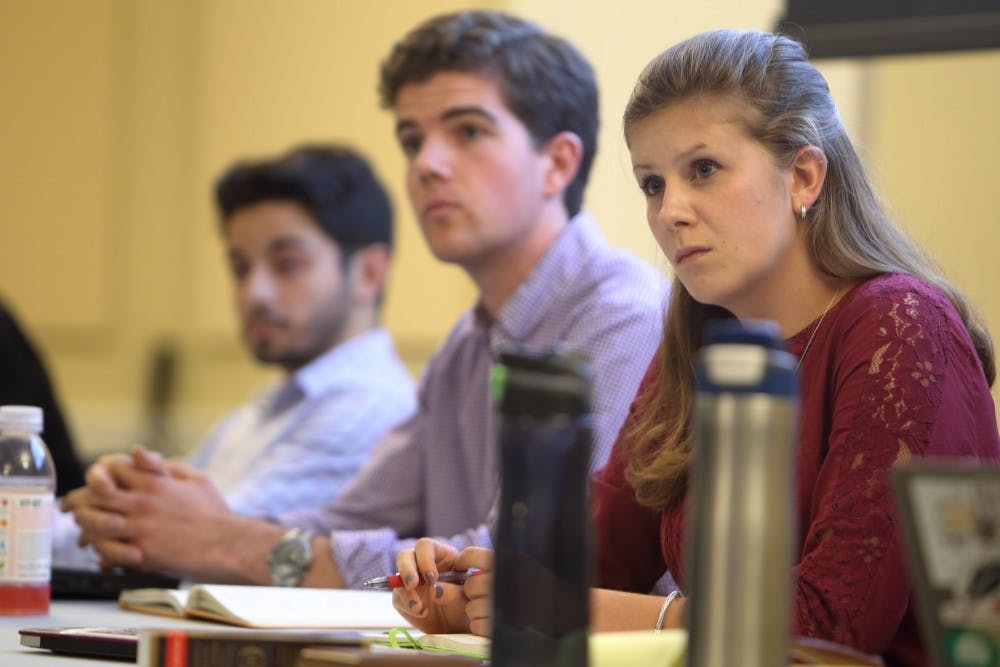The white supremacist rallies of Aug. 11 and 12 brought, with shock and violence, scenes of a city and nation in disrepair. The tensions at the heart of Charlottesville, between its residents and the University they host, between its longstanding constituents and its oblivious gentrifiers, between its bloodied history and its liberal identity, had settled into an uneasy inertia. The Robert E. Lee statue would go and the parks would be renamed, but the waiting list for affordable housing would remain just as long and neighborhoods just as segregated. The terrorism Charlottesville suffered has reinvigorated those strains, and in turn demands that we reflect on what we can do to ease them.
Displaying leadership consistent with its storied past, the Black Student Alliance released 10 demands that have appropriately set the agenda for student government and activism. The list addresses some of the University’s most persistent injustices, solutions to which should be swiftly implemented. However, as we weigh whether all of its recommendations are consistent with the common pursuit of a fairer, more inclusive University and Charlottesville we should not lose sight of the simple, sometimes frustrating necessity of deliberation and basic decency.
To be sure, the need for action is undeniable. A brave Charlottesville resident and activist, Heather Heyer, was murdered in cold blood by the forces of white supremacy on Aug. 12. Their ability to march through our streets and our Lawn with weapons itching to be unleashed is terrifying. The University and the Charlottesville police department’s botched response to this event should cause us to ask why peaceful counter-protesters on July 8 deserved to be tear-gassed while neo-Nazis were given a wide berth. It simply does not make sense, and our institutions should be held accountable.
The BSA’s demands address this, and more. Gun-toting fascists should not come anywhere near the Lawn or our Grounds in general. It is unacceptable that only 6.4 percent of students enrolled at the University are African-American, and that this proportion is halved to three percent for faculty. The University should acknowledge donations received from the KKK in the past and reinvest that money in the community, and Confederate plaques should be ripped out of the Rotunda as fast as possible. It should also, if legal, bar Jason Kessler, Richard Spencer and all other members of the groups at the white supremacist rally from Grounds. A broad education initiative required for all students is appropriate and important, and the University should have a strategic and actionable diversity plan. The imperative for change presented by these demands is clear.
Less clear, however, is whether these demands compel the University to use its enormous influence to better the lives of minority communities in Charlottesville beyond the vaguest of terms, and of course, whether the Jefferson statue in front of the Rotunda is necessarily an emblem of white supremacy. The University’s expansion is inextricably tied with the impoverishment of Charlottesville’s African-American community, as Vinegar Hill exemplifies, but little is said or recommended concerning this fraught relationship.
Thomas Jefferson’s legacy is endlessly complex and litigated. He was an unrepentant slave-owner, a man of monstrous flaws, but he placed the transcendent creed of universal equality at the heart of the American project. The details of the BSA’s proposed contextualization of Jefferson, as well as what steps an actionable diversity plan might take, are crucial, and we should engage as a community in a deliberative process to tease them out.
The need for deliberation along with basic civic decency is what made The Cavalier Daily Editorial Board’s recent piece seem so tone deaf. The BSA’s demands were first presented to the University community at large on Aug. 21, and by Aug. 23, the Editorial Board was howling that Student Council had not fully considered the implications of some very serious proposals. After all, it’s only “a 10-item list,” the brevity of which obviously means that it does not require all that much thought. Student leaders do have busy schedules, despite the Board’s obtuse sarcasm, and we should learn from its poorly-considered position to inject some kindness and understanding into the discourse of student self-governance.
How we conduct ourselves as stakeholders in these intersecting communities we call the University and Charlottesville in this time of crisis will help to define both for years to come. We should proceed with deliberation when necessary, with determination when we know we are in the right and with charity toward those we deem to be in the wrong. In this way, we create our ripple of hope.
Olivier Weiss is an Opinion Columnist for The Cavalier Daily. He can be reached at opinion@cavalierdaily.com.







